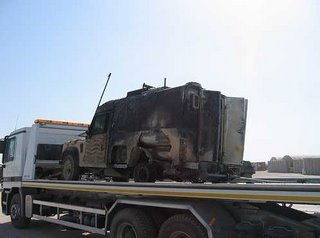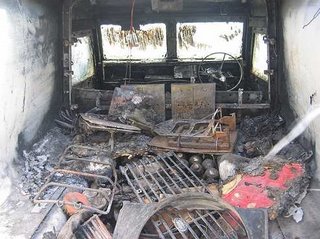 Inevitably – and of course rightly – the world's media is concentrating on the growing crisis in Israel, and is giving the deteriorating situation saturation coverage. However, this is exacerbating a problem which has existed for some time – that other hot spots are simply not being covered at all, or very thinly indeed.
Inevitably – and of course rightly – the world's media is concentrating on the growing crisis in Israel, and is giving the deteriorating situation saturation coverage. However, this is exacerbating a problem which has existed for some time – that other hot spots are simply not being covered at all, or very thinly indeed.That much is evident from the reporting of the raid by British troops on a house in the tribal area of Garmat Ali in the north of Basra over the weekend, where one British soldier was killed and another wounded. The report in The Times today is about the most comprehensive but even then the journalist, James Hider, is honest enough to present his by-line as "in Baghdad".
This reflects the fact that there simply no independent western journalists in Basra at this time, leading to the almost surreal situation where the local Iraq Agency is reduced to citing a report from The Scotsman, as its only coverage of the event.
Journalists themselves cannot be blamed as Basra is clearly dangerous, viz the appalling incident in August last when freelance American journalist, Steven Vincent was killed. He had been writing about the rise of conservative Shiite Islam and the corruption of the Iraqi police, when he was abducted and shot to death in Basra, the first time an American journalist had been deliberately attacked and killed during the war.
Then, in May of this year, two British journalists were killed and an American woman journalist critically wounded in Basra after their vehicle was targeted by a roadside bomb.
 But, rather than make special provisions for protecting journalists, as the Americans have done in Baghdad – hence the location of The Times reporter – it seems that the authorities, and especially the British, are capitalising on the situation, closing down any independent reporting. Thus we hear muted but persistent reports about how the media are being muzzled or reporters' access curtailed.
But, rather than make special provisions for protecting journalists, as the Americans have done in Baghdad – hence the location of The Times reporter – it seems that the authorities, and especially the British, are capitalising on the situation, closing down any independent reporting. Thus we hear muted but persistent reports about how the media are being muzzled or reporters' access curtailed.This is especially significant in relation to the weekend Basra raid which, by all accounts, involved some 600 British troops and therefore was larger in terms of effort than last week's attack in the Sangin district of Helmand province, Afghanistan. Yet, no press photographs have emerged from the action and all media reports are reliant on copy-outs from MoD press releases and statements.
It is from them that we learn that, in addition to the dead and injured soldier in the raid, there was another incident. Two more soldiers were wounded when their vehicle was hit by a roadside bomb, according to AFP, on the road to Al-Zubair, southwest of Basra, lightly wounding them.
Obviously, the immediate question is the nature of the vehicle the soldiers were travelling in, but the MoD is refusing to release any further details for "reasons of operational security".
But it is another article, in the Telegraph which really demonstrates the extent of the MoD clampdown. The story, in today's edition, records how soldiers wounded in Iraq and Afghanistan are being denied vital support because the Government is refusing to release their details to charities.
This is a complaint by the Royal British Legion, which says that injured troops, including many who are permanently maimed, are leaving the military hospital in Selly Oak, Birmingham, without being told of the assistance being offered by charities. "We are simply not getting any information on numbers of wounded," said Brig Ian Townsend, the legion's director general. "We have sought the information from the Ministry of Defence on who is going through the hospital but we are simply not getting it", he says.
Thus, while in our campaign on Snatch Land Rovers we have been focusing on fatalities, which have been reported, the veil of secrecy extended by the MoD is clearly concealing the fact that the situation is actually much worse than the bald figures have so far revealed.
Piecing together what we can, the lead photograph shows a Snatch Land Rover which was damaged by a roadside bomb in Basra in late May. The crew survived the attack but three soldiers were injured. A jeering crowd then surrounded the vehicle, throwing grenades and petrol bombs, forcing troops to flee before the Land Rover caught fire, one Iraqi brandishing a soldier's helmet seized in the fray.
How many more of these incidents there have been we simply do not know but, one thing is for certain, whatever is going on, we are not being told anything like the complete truth.
COMMENT THREAD
No comments:
Post a Comment
Note: only a member of this blog may post a comment.